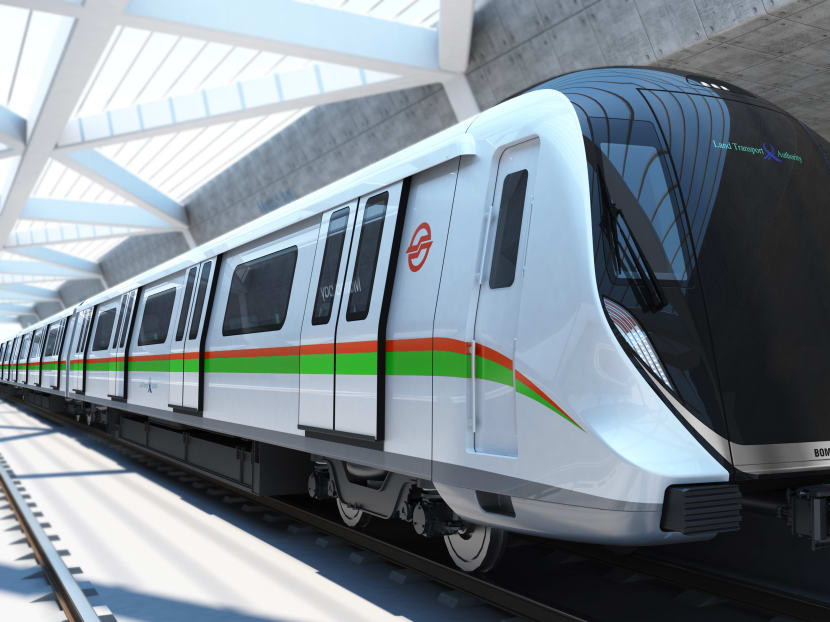‘Pioneer’ batch of 30-year-old trains on NSEWL to be replaced in S$827 million deal
SINGAPORE — The North-South and East-West lines (NSEWL) will get a new fleet of trains in a contract worth S$827 million, to replace the inaugural batch of 66 trains which have been running for more than three decades.

The 66 new trains by Canadian company Bombardier — designed to be accessible for all commuters including wheelchair users, parents with strollers and commuters with personal mobility devices or foldable bicycles — will have wider spaces near the doors.
SINGAPORE — The North-South and East-West lines (NSEWL) will get a new fleet of trains in a contract worth S$827 million, to replace the inaugural batch of 66 trains which have been running for more than three decades.
The deal could be worth up to S$1.2 billion, if operator SMRT takes up an option for long-term service support for the trains, which have a design life of 30 years.
The 66 new trains by Canadian company Bombardier — designed to be accessible for all commuters including wheelchair users, parents with strollers and commuters with personal mobility devices or foldable bicycles — will have wider spaces near the doors.
"Without reducing the number of seats in the trains, our engineers have catered for wider spaces near the doors to allow passengers to enter and exit the trains more easily," said Transport Minister Khaw Boon Wan at the signing ceremony for the new trains on Wednesday (July 25).
The first batch of the new-generation six-car trains is scheduled to be delivered from 2021, and will be fitted with sensors to diagnose and fix anomalies early, he said.
"Our engineers will be able to use these systems to diagnose and rectify anomalies early, significantly reducing the likelihood that these anomalies become train faults and affect commuters," he added.
Four of the trains will be fitted with an Automatic Track Inspection system of cameras, lasers and sensors to detect rail defects and avoid train disruptions.
The new trains will be designed in Singapore and Germany, and manufactured in China.
Of the nearly 200 trains plying the NSEWL, the inaugural fleet of 66 six-car trains was built by Kawasaki Heavy Industries.
The inaugural fleet was refurbished between 2004 and 2008. However, there is a limit to how much upgrading and refurbishment the government can do to keep these trains running smoothly, said Mr Khaw, who is also the Coordinating Minister for Infrastructure.
"Thirty years of wear and tear is significant," he said.
LTA may preserve one or two of the "pioneer" trains for display to the public, the minister added.
The replacement of the 66 trains is part of the government's plan for a comprehensive renewal of the NSEWL. The renewal exercise is now at the halfway mark.
In November last year, Mr Khaw spoke of urgent plans to renew six core components of the NSEWL by 2024, which are namely the sleepers, third rail, signalling system, power supply, track circuits and the old first-generation trains which were delivered in 1986 and have been in operations since 1987.
The signalling systems, sleepers and third rails which supply electrical power to the train have been renewed.
Plans are afoot to renew the power supply and replace the track circuits, both of which will happen later this year.
Mr Khaw said: "All these works will again require more periods of early closures and late openings. I seek commuters' understanding in advance."
Bombardier, which snagged the new trains contract out of five tender bids, is no stranger to Singapore's railway system. The company earlier supplied all 92 trains for the Downtown Line.
In March, the Land Transport Authority (LTA) also inked a four-year S$344 million deal with Bombardier to renew the Bukit Panjang Light Rail Transit, which includes a separate 10-year contract for the company to provide long-term service support for the renewed system.
CLARIFICATION: An earlier version of this article reported that LTA received four bids for the new trains contract. The agency has clarified that there were five tender bids.
Sign up for TODAY's WhatsApp service. Click here:
Sign Up








